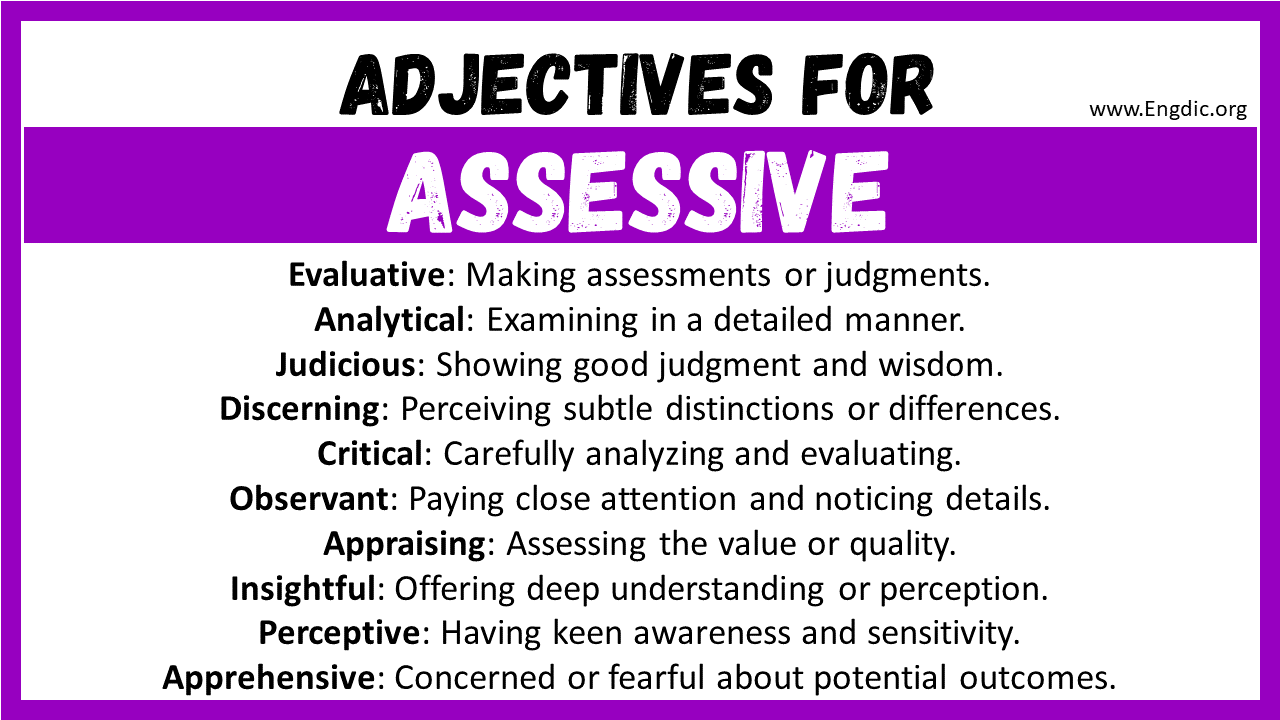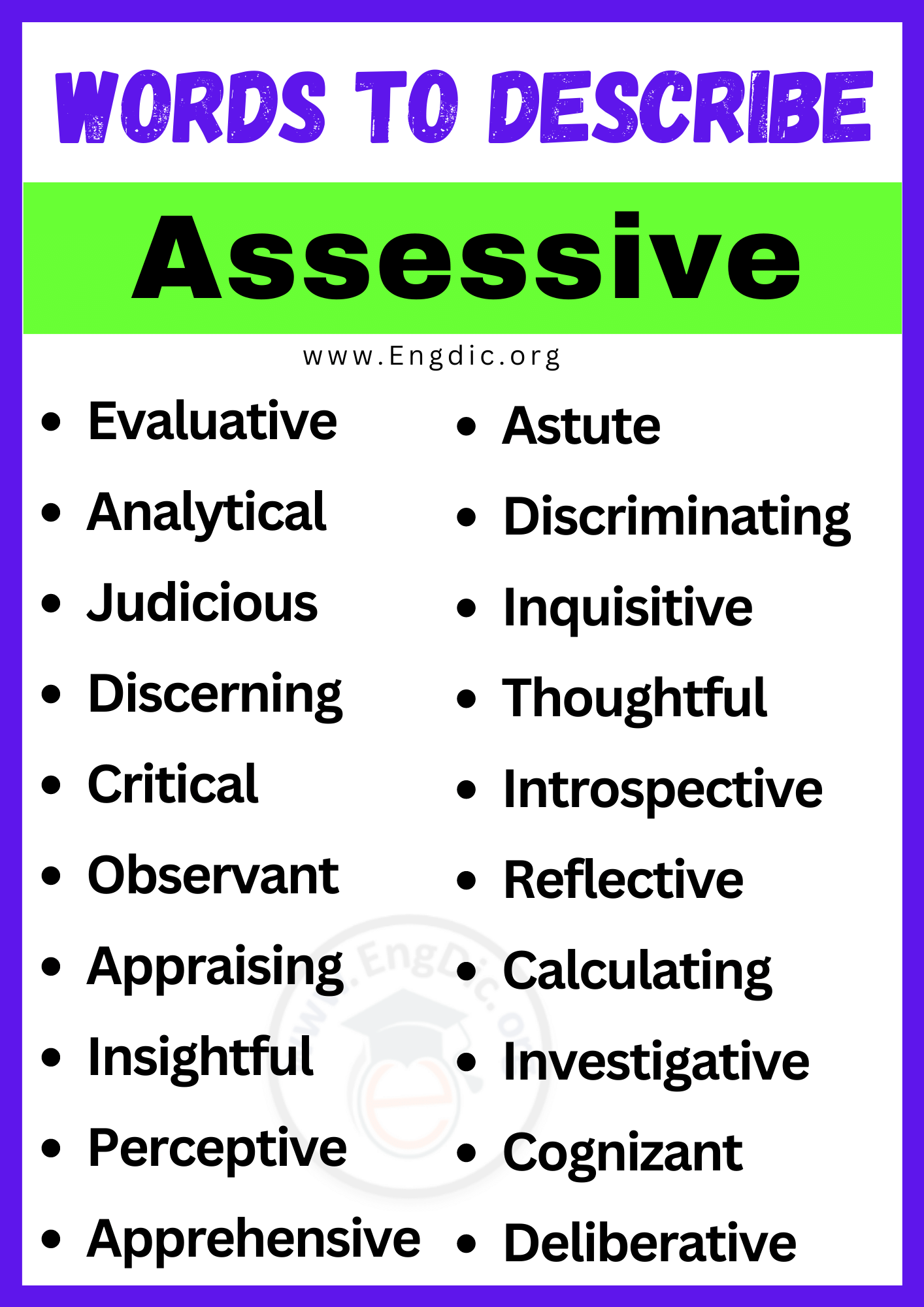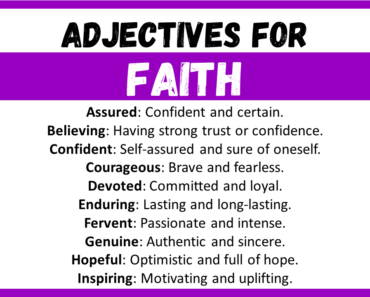Introducing the concept of “assessive”: Have you ever struggled to find the right words to describe someone’s behavior or character accurately? Well, worry no more, as we dive into the fascinating world of “assessive” words. Simply put, assessive terms are powerful descriptors that help us evaluate and characterize individuals, situations, or even emotions with precision.
In this blog post, we’ll explore the significance of these expressive words and how they contribute to a richer understanding of the world around us.
Adjectives for Assessive
Here are the 20 Most Popular adjectives for assessive:
- Evaluative
- Analytical
- Judicious
- Discerning
- Critical
- Observant
- Appraising
- Insightful
- Perceptive
- Apprehensive
- Astute
- Discriminating
- Inquisitive
- Thoughtful
- Introspective
- Reflective
- Calculating
- Investigative
- Cognizant
- Deliberative
Words to Describe Assessive with Meanings
- Evaluative: Making assessments or judgments.
- Analytical: Examining in a detailed manner.
- Judicious: Showing good judgment and wisdom.
- Discerning: Perceiving subtle distinctions or differences.
- Critical: Carefully analyzing and evaluating.
- Observant: Paying close attention and noticing details.
- Appraising: Assessing the value or quality.
- Insightful: Offering deep understanding or perception.
- Perceptive: Having keen awareness and sensitivity.
- Apprehensive: Concerned or fearful about potential outcomes.
- Astute: Clever and shrewd in observation.
- Discriminating: Distinguishing between various elements.
- Inquisitive: Curious and eager to learn.
- Thoughtful: Showing consideration and contemplation.
- Introspective: Examining one’s thoughts and feelings.
- Reflective: Thoughtfully thinking back or pondering.
- Calculating: Analyzing with deliberate planning or strategy.
- Investigative: Seeking to uncover information or facts.
- Cognizant: Being aware and mindful of situations.
- Deliberative: Carefully considering options before deciding.
Example Sentences for Assessive Adjectives
- She gave an evaluative nod of approval.
- His analytical mind solved the puzzle quickly.
- The judge made a judicious ruling.
- Discerning eyes noticed the subtle change.
- The article provided a critical analysis.
- The detective’s observant nature cracked the case.
- He’s always appraising the situation carefully.
- Her advice was insightful and comforting.
- The artist’s perceptive eye captured emotion.
- Apprehensive about the upcoming exam.
- The astute businessman made a wise investment.
- His discriminating taste in art impressed everyone.
- The inquisitive child asked endless questions.
- She left a thoughtful note on his desk.
- His introspective nature led to self-improvement.
- The poem was a reflective expression of loss.
- The calculating politician carefully planned his speech.
- The journalist’s investigative reporting exposed corruption.
- She’s always cognizant of others’ feelings.
- The team held a deliberative meeting to decide.
Explore More Words:
Adjectives for Athlete |Ambience |
FAQ’s
How to describe assessive writing?
Assessive writing involves critically evaluating and analyzing content to form an informed judgment or opinion.
What is Access history?
Access history refers to a record of activities and interactions with a system, database, or website that helps track user interactions and data changes.
Why use Access?
Access is used as a versatile database management system, allowing users to efficiently organize, retrieve, and analyze large sets of data for various purposes.








